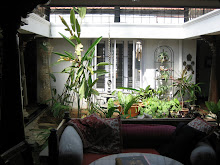 Everyone knows about this tea. The ubiquitous Menghai 7542. It is a great starting point into the world of puerh... a classic recipe characterized by woody notes and a percolating sweetness. It is a masticated plantation leaf tea, and was made in a time when 'organic' wasn't a phase, but the whole world was probably cleaner. It is also a pre-boom tea cake, which I feel is a good start. This tea feels alive and vibrant, and really makes me question the movement toward single estate products. If plantation tea ages like this, one can only hope for such a bright future for all the beengs out there nowadays.
Everyone knows about this tea. The ubiquitous Menghai 7542. It is a great starting point into the world of puerh... a classic recipe characterized by woody notes and a percolating sweetness. It is a masticated plantation leaf tea, and was made in a time when 'organic' wasn't a phase, but the whole world was probably cleaner. It is also a pre-boom tea cake, which I feel is a good start. This tea feels alive and vibrant, and really makes me question the movement toward single estate products. If plantation tea ages like this, one can only hope for such a bright future for all the beengs out there nowadays.I'm fortunate enough to own a few of these classic beengs...
Here is my personal experience with the tea:
I usually brew a pretty full gaiwan, probably close to 10 grams, and I'm always tempted to inhale the first wash deeply. The chopped hay fragrance hangs in the air with a hint of sweeter and deeper mulch piles. The infusion times I most frequently use are close to:
Wash, 10s, 8s, 10s, 20s, 35s, 60s, 90, 120...

(I say "close to" because lately I have been experimenting with fewer leaves longer steeps.)
The first sip usually makes me roll my head in goodness like Zimmern does on Bizarre Foods when he's eating some streetfood in Goa. There is a woodsy hay taste, but in good balance with a with refreshing rainwater, and carmelized sweetness.
Unfortunately, the first sip is the highlight of the tea, as it dies a slow dissipating death into rather empty sweetness. However, the vibrancy in the first sip and the dancing hay on your tongue, make this a well appreciated and collectible cake.

No comments:
Post a Comment